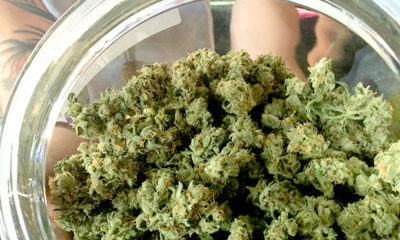
Medical
Why the Best Marijuana Legalization Law Yet is in North Dakota
Unlike Colorado, Washington, Oregon, California, and everyone else to come before, Measure 3 in conservative North Dakota is the most progressive marijuana legalization proposal yet.
Common critiques of marijuana legalization follow a few simple lines of logic. One is that allowing adults 21 and over to possess marijuana without a doctor’s recommendation isn’t legalization at all — at least not really.
If cannabis were truly legal in places like Canada, Colorado, Washington, California, and the other states where adults enjoy the legal right to purchase marijuana in a state-licensed retail storefront, this argument goes, there would be no limits on how much cannabis an adult could purchase, possess, or cultivate. There would be no taxes or regulations. There would just be us and the weed.
This is as much a critique of capitalism or government in general as it is cannabis policy — and probably belongs in the same conversations as overthrowing the government or replacing the market economy (that is: they are massive undertakings that may be beyond the ken of drug-policy reform). At the same time, few would argue that most states’ medical or recreational legalization measures are anywhere close to perfect; they are probably better seen as “good starts,” which is not to say they do not have value.
But so far, only one state is edging close to achieving the libertarian’s nirvana described above — and it’s North Dakota, which has since 2016 been the unexpected and welcome surprise of the marijuana-reform movement. North Dakota voters legalized medical marijuana on Election Night 2016 by a wide margin, at the same time as fellow Trump-supporting red states Arkansas and Florida
And if voters in that state approve Measure 3 on Election Day next month, conservative North Dakota could have some of the most liberal marijuana laws in the country. In stark contrast to more progressive states where marijuana “legalization” stops at 1 or 2 ounces, adults would be able to possess marijuana with no possession limits.
If passed — and according to current polling from NORML, one of the ballot measure’s few sponsors, it has a good chance of passing — Measure 3 would also expunge past convictions for marijuana crimes. Compare that to the process in other blue states like California and Washington, where marijuana “offenders” have had to hire lawyers to file petitions to get their records cleared. And not every state that’s legalized marijuana has gone this far. Massachusetts hasn’t (and neither have dispensaries opened up for business, nearly two years after the state legalized marijuana).
Why is cannabis such an easy sell in such a conservative area? While it’s been true for a while that legalization is a bipartisan issue, Great Plains states like North Dakota also tend to skew towards a small-government libertarianism that tracks nicely with drug policy reform.
This is not to say that the state is perfect, or will implement legalization perfectly if it passes — or that it will pass at all. Patients in Arkansas and North Dakota are still waiting for medical-marijuana dispensaries to open, and patients in Florida have seen fit to file several lawsuits against the state to overturn what they perceive (probably correctly) as overly restrictive laws designed to limit cannabis access as much as possible while still allowing it in some form.
As North Dakota state Rep. Rick Becker told reporters, it’s possible that the Legislature could intervene following Measure 3’s passage and change it.
Either way, the mere fact that red-state voters had no issue with allowing adults to possess in theory entire truckloads worth of cannabis is significant — and maybe the clearest sign yet that any lingering prohibition-era qualms over cannabis per se are finally dissipating.
TELL US, do you think there should be no limits on how much cannabis a person can purchase, possess and cultivate?























